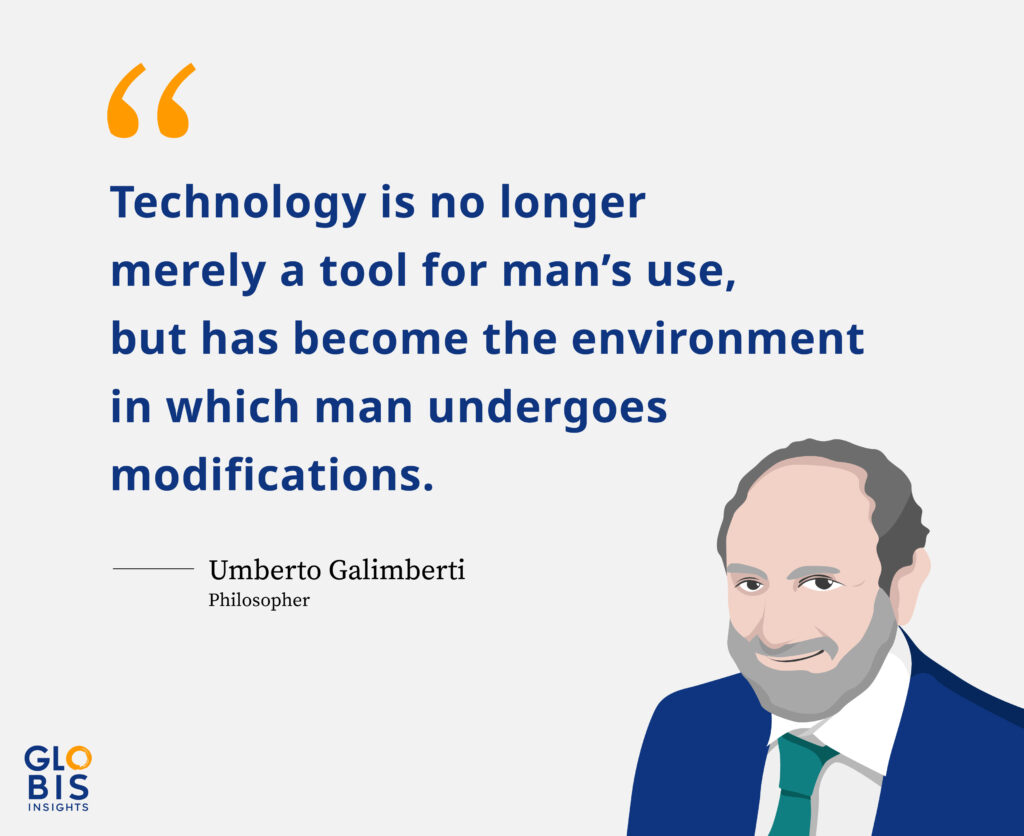Sustainable Innovation in Times of Disruption: Choices for a Better Society
There are opportunities for progress all around us. The key is to innovate on these opportunities sustainably.
To help identify most effective path forward, you'll need to gain a global perspective to these challenges in an open discussion. How can Japan and the world take action to create a more sustainable, innovative world? Where do you fit in?
It's time to find out.
Servant Leadership
There's more to leadership than driving a team to profit. In fact, there's a word for looking beyond self-interest to prioritize individual growth: servant leadership. Try this course for a quick breakdown of what that is, how it works, and how it can lead to organizational success.
As technology continues to shape the world of business, questions about ethics, morality, and social responsibility become more and more pressing.
Businesses, as ever, strive to innovate and improve efficiency, but they must also consider the impact of their actions on individuals, communities, and the planet as a whole. Automation and artificial intelligence, for example, continue to raise questions about the future of jobs and the meaning of work. These issues require a deep understanding of philosophical concepts and principles, as well as a commitment to ethical decision-making.
Sustainable Innovation in Times of Disruption: Choices for a Better Society
There are opportunities for progress all around us. The key is to innovate on these opportunities sustainably.
To help identify most effective path forward, you'll need to gain a global perspective to these challenges in an open discussion. How can Japan and the world take action to create a more sustainable, innovative world? Where do you fit in?
It's time to find out.
Organizations need a sound, ethical business philosophy.
The philosopher Umberto Galimberti states that technology “is no longer merely a tool for man’s use, but has become the environment in which man undergoes modifications.”
Philosophers, business leaders, and technologists constantly grapple with this reality–and many of them look to great philosophers past and present for ways to create a more equitable and sustainable economic system.
Next Article
Japanese Values for Better Business in the Modern Age
Japanese Gods, Art, and Management Theories in the Modern Era
Aristotle & Immanuel Kant: Ethics and Fairness
Considering the work of prominent philosophers often starts with Aristotle. As one of the most famous ethical leaders, his ideas about prudence and fairness have inspired focus on building ethical leadership and sustainable company cultures that benefit society as a whole.
Servant Leadership
There's more to leadership than driving a team to profit. In fact, there's a word for looking beyond self-interest to prioritize individual growth: servant leadership. Try this course for a quick breakdown of what that is, how it works, and how it can lead to organizational success.
Already, that influence has had a profound impact on business leaders such as John Mackey, CEO of Whole Foods Market, and Paul Polman, former CEO of Unilever. Mackey advocates for businesses to create value for all stakeholders, including customers and employees. His book, Conscious Capitalism, draws heavily on Aristotle’s teachings. Polman, on the other hand, champions sustainable business practices and believes in a company’s responsibility to create positive social and environmental impacts. He cites Aristotle’s concept of eudaimonia, which pertains to human flourishing, as a guiding principle for his business approach.
More modern philosophers, too, like Immanuel Kant, have been influential in shaping business practices that prioritize fairness, honesty, and transparency. Kant has influenced the development of corporate social responsibility (CSR) and stakeholder capitalism. His ideas make bottom lines sexy while also emphasizing the importance of treating people as ends in themselves, rather than a means to an end.

Nietzsche: Individualism and Creativity
Nietzsche’s work emphasizes individualism and creativity.
This perspective has inspired many business leaders to take risks and embrace innovation. Among them is Jeff Bezos, the founder of Amazon, who emphasizes bold risk-taking and embracing failure to achieve success.
Next Article
Zen and the Design Thinking Mindset of Steve Jobs
Confucius & Zen Buddhism: Simplicity, Mindfulness, and Focus
In East Asia, Confucius introduced ideas about ethics, respect, and social responsibility. His emphasis on the importance of relationships and community have influenced the development of business practices that prioritize long-term partnerships and stakeholder engagement.
Jack Ma, the founder of Alibaba, has cited Confucian ideals such as humility, respect for authority, and a focus on education as key factors in his success.
Buddhism, too, famously inspired Apple cofounder Steve Jobs, who prized simplicity, mindfulness, and focus–all core tenets of Zen philosophy.
Stoicism: Rational Thinking and Control
Ancient philosophers like Epictetus have influenced leaders such as Ray Dalio, the founder of Bridgewater Associates, to incorporate stoicism. His and similar business philosophies focus on rational thinking, emotional control, and the acceptance of what cannot be changed.
Spinoza & Benjamin Graham: Value Investing
The Dutch philosopher Baruch Spinoza structured the concept of value as we understand it today, especially in the customer-centric approach praised by every modern company. Benjamin Graham took this one step further to introduce the concept of value investing.
Warren Buffett, the legendary investor and CEO of Berkshire Hathaway, is considered the father of value investing. But Buffet’s investment strategy was significantly impacted by Graham’s ideas about investing in undervalued companies and focusing on fundamentals.
Next Article
Japanese Values & Longevity: The Oldest Companies in the World
Business Philosophy and the Tech Industry
Philosophy has influenced and inspired business leaders throughout history and helped them achieve great success. It can now help guide the tech industry in some key ways:
Inquiry
Philosophy puts a focus on inquiry. In a world of endless options, this can help tech companies not just define their purpose and vision, but also boost instrumental processes like product management–one of the pillars of the tech industry.
Inquiring also encourages creativity and innovation, since workers naturally consider more options when incorporating philosophical thinking.
Critical Thinking
The World Economic forum includes analytical thinking and complex problem solving–more broadly, critical thinking–among the top ten skills managers will need by 2025. Philosophy boasts the founding fathers of critical thinking: Socrates for his method of questioning and René Descartes for emphasizing the importance of skepticism and doubt.
Critical thinking opens the door to diverse perspectives. Tech companies armed with a philosophical approach can more easily create inclusive workplaces where different voices are heard and valued.
Long-term Thinking
Tech companies with a strong business philosophy have a much better chance to develop sustainable products and services. They’re also better equipped to have a positive impact on society over the long term.
Peter Singer, a contemporary philosopher, has written extensively about the importance of long-term thinking in the context of global issues such as climate change and poverty. He even received an award from BBVA Bank for advocating the consumption of synthetic meat. In these key ways, with all the ethical implications that arise in the creation and deployment of new technologies, philosophy can provide a much-needed healthy perspective. Tech companies, whether large corporations or small businesses, can use the ideas of great thinkers past and present to guide their mission statement. This will help identify a code of ethics, avoid negative consequences, and boost acceptance among the public.







